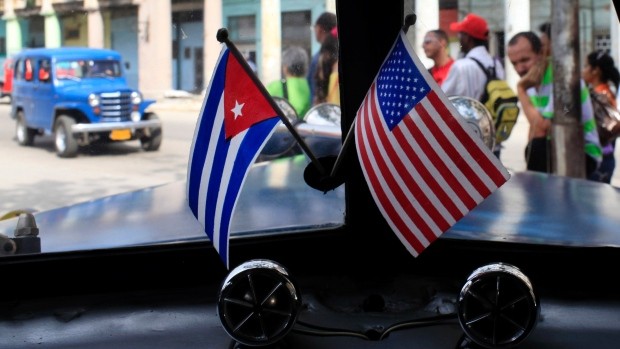The Impact Of Ending The US Embargo On Cuba_1
Post on: 24 Июль, 2015 No Comment

President Barak Obama’s January 2015 announcement that the United States would ease restrictions on trade and travel with Cuba was greeted with high enthusiasm by cigar aficionados, rum drinkers, and leisure travelers. The prospect of access to forbidden fruit is certain to create an instant market in the United States for Cuba-related products. It will also create interest among investors hoping to profit from that newfound market.
Follow the Money
While the easing of restrictions is just the first step toward opening the US market to mass distribution of Cuban products, the reality is that Cuban products are already widely available in Europe and other parts of the world. If and when the United States becomes a more active trading partner with Cuba, it is likely that the same European multinational corporations that distribute Cuban products to the rest of the world will control distribution of those products in the United States as well. To understand the potential opportunity for investors, it is helpful to know a little bit of history, have some insight into how big business works in Cuba, and be familiar with the companies currently generating profits from Cuban products.
A Brief History Lesson
When Fidel Castro came to power in 1959, an enormous portion of the Cuban economy was under the control of US corporations. US companies dominated utilities and railroads. US firms also controlled a significant portion of the island’s natural resources, including sugar, cattle, tobacco, timber, oil, mining, and the vast majority of the nation’s farmland.
The Castro government nationalized these assets, claiming them in the name of the Cuban people. To summarize a long, complex story, the US retaliated by putting a trade embargo in place in an effort to topple the Cuban government. After more than five decades, that included the breakup of the Soviet Union, the end of the Cold War, and the passing of the torch from Fidel Castro to his brother Raul, it is clear to all parties that the trade embargo did not achieve its objectives. Today, many argue that the embargo serves no real purpose and that ending it will not only make US consumers happy, but also help the US economy and further the goal of bringing a greater level of freedom to the island nation.
Big Business Communist Style
While the Revolution may have freed the island from the dominance of US business interests, even the communists want to make a profit. Accordingly, the Castro government has entered into agreements with European-based multi-national firms to distribute Cuban products, including cigars and rum.
British company Imperial Tobacco, which trades on the London stock exchange under the ticker IMT, has exclusive rights to distribute Cuban cigars worldwide via a tangled web of corporate entities that includes 50% ownership of Corporación Habanos, the Cuban government’s tobacco company. Habanos, as it is known in Cuba, controls its brand by entering into limited and carefully controlled distribution agreements in each country in which it does business. If you light up a Cuban cigar anywhere in the world, a portion of the profits flows back to Imperial Tobacco.
Cuba’s rum business weaves a similarly tangled web. When Castro took over, rum makers including Bacardi Limited and Jose Arechabala S.A. were thrown out of the country. The French entered the fray when Pernod Ricard (traded in France under RI.PA) joined forces with Cuba’s state-run Cubaexport and began selling the storied Havana Club brand of rum formerly produced by Jose Arechabala. (Bacardi produces a rum with the same name in Puerto Rico, using a recipe from the Arechabala family, that is sold only in the US.)

While the distribution rights to the Cuban products that are likely to be of the greatest interest to the average American appear to be locked up by existing players, there is a potential wildcard in the deck. Reasonable estimates place the total value of US assets seized by the Cuban government at somewhere in the $7 billion range. US law requires that money to be repaid before the trade embargo can be lifted. While it is highly unlikely that the Cuban government will hand over the cash, there’s always the possibility that some other arrangement could be made, opening the door to new distribution partners.
On the tourism front, travelers already make the way to Cuba via Canada, Mexico, Europe, and other countries. US visitors would certainly be a boon to the island, and a host of cruise companies and airlines would certainly be willing to accommodate their desires. The Cuban government would, naturally, find a way to profit too. Carnival Cruise Lines has already expressed interest in opening up the Cuban market and other major operators would certainly follow suit. Cruise company stocks rose in price immediately after the Obama administration’s announcement, even though the status of leisure travel has not changed.
Beyond its high-profile exports and the allure of a warm climate, Cuba presents the possibility of profitability for much more mundane enterprises as well. Food, clothing, and agricultural implements are all potential Cuban imports. The island’s aging infrastructure will need to be updated, which should present opportunities for construction firms, purveyors of cement and other building materials, engineers, architects, and home builders. Real estate agents are also likely to be in demand as Americans seek second homes and/or retirement homes in a sunnier part of the world. Automobile sales are another possible opportunity, as Cubans seek new cars and Americans buy their old ones. Shipping companies and ports would make money and generate jobs, particularly in the southern portion of the United States, as an increasing number of products are delivered back and forth between the two nations. In addition, large and mid-sized businesses and entrepreneurs both on and off the island are likely to identify profitable niche opportunities for everything from seafood to suntan lotion as renewed relations create new opportunities.
The Bottom Line
So just when will all sanctions be lifted and trade relations normalized? Most experts agree that it won’t be anytime soon. Diplomatic ties are often slow to develop, the politics relating to Cuba are complex, and businesses may be cautious about entering into relationships with a country known for nationalizing assets. In the meantime, Cuba’s forbidden fruit will continue to tantalize the dreams of their northern neighbors.














